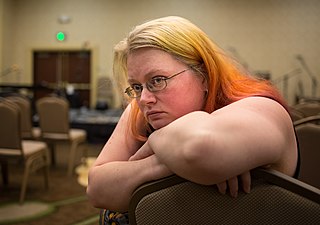A Quote by Jillian Medoff
My novels are never truly finished, even if they're published and sitting on the shelf. While I may no longer be interested in spending time with that particular set of characters, I can't help but think about all the ways the book could be different, the small, insignificant tweaks that no one but me would ever notice.
Related Quotes
I didn't set out to write a book with no real male characters, but men were not important to my narrator, who was much more interested in maternal and pseudo-maternal love, so they were unimportant to me. I didn't even notice the lack of men in the story until I finished it. But once I did notice it, I was kind of delighted. Apparently, my subconscious is totally sexist.
If the book is finished—published and on the shelf—I do not think of revising it. But if I'm not finished psychologically with characters, they will recur, either as themselves or as new, slightly altered manifestations, and their same issues will reappear. It's a matter of the subject and emotional investment and my own obsessive thinking about various issues It's an unconscious process. To say that a single story is not done isn't quite true. A story can be finished and judged successful or not by somebody else, but if the issue is not done for me, I can count on its reappearance.
I wrote for years before I was ever published, and I don't think I could ever stop. That said, I was also a veterinarian before I sold my first book, and I still volunteer my time to help with animal welfare causes. So that is a career I would be happy to return to - while still secretly writing strange stories back in my doctor's office.
I was perpetually grief-stricken when I finished a book, and would slide down from my sitting position on the bed, put my cheek on the pillow and sigh for a long time. It seemed there would never be another book. It was all over, the book was dead. It lay in its bent cover by my hand. What was the use? Why bother dragging the weight of my small body down to dinner? Why move? Why breathe? The book had left me, and there was no reason to go on.
You want to stay alive in a zombie swarm? You go alone or in a small group, where everyone is of similar physical condition and weapons training. You never stop, you never hesitate, and you never show any mercy for the people that would slow you down.That is what the military says we should do, and if I ever meet anybody who listens to that particular set of commands, I may shoot them myself just to improve the gene pool. When you can help people stay alive, you help them. We're all we've got.
It just never occurred to me that a school’s policy and student culture could make a big difference in the way I would experience my body while on campus. I didn’t think there was anything to choose about a sexual culture. I’d only ever known the one I grew up in. But it did matter, and in ways I wouldn’t have even predicted.
I read one book where the characters never said anything; instead, they spent all their time grunting and bleating and hissing and cooing and growling and chirping and... It was like a menagerie in there. After a while, I wasn't even taking in the rest of the book, because that was all I could see: the dialogue tags.
I'm always sitting down and talking to people that are doing independent features. It depends on the project and the quotient of the people that are involved. There are a lot of different reasons [to do something], like a particular script that resonates with me, in a particular way. It may not so much even be about the part, but what the script has to say.
It's funny - for a long time, I didn't know I was writing a book. I was writing stories. For me, each story took so long and took so much out of me, that when I finished it, I was like, Oh my gosh, I feel like I've poured everything from myself into this, and then I'd get depressed for a week. And then once I was ready to write a new story, I would want to write about something that was completely different, so I would search for a totally different character with a different set of circumstances.
Once I've properly finished a book, my ideal state of being would be to never think about it again. But with 'Capital,' I felt I'd spent so much time with the characters that they were very, very real, and I definitely had a sense of loss about leaving them behind in a way I've not quite had before.
I got so discouraged, I almost stopped writing. It was my 12-year-old son who changed my mind when he said to me, "Mother, you've been very cross and edgy with us and we notice you haven't been writing. We wish you'd go back to the typewriter. That did a lot of good for my false guilts about spending so much time writing. At that point, I acknowledged that I am a writer and even if I were never published again, that's what I am."






































